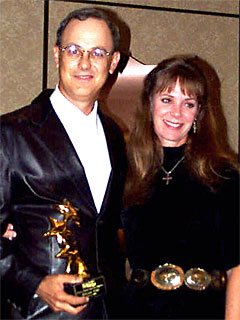Legacy (Part II)
In his commentaries and interviews, Michael Piller talked often of what he learned from Gene Roddenberry, in his first year as a writer and producer for The Next Generation, and Roddenberry’s last year as an active executive producer.
Piller said that in particular his goal in writing the script for
Star Trek: Insurrection was to return Star Trek to the Roddenberry approach to the future. He felt he was “the keeper of the flame.”
Of those who came after Roddenberry, Piller often seemed to best understand GR’s Star Trek. Already that Star Trek is being forgotten and dismissed, yet the flame is still alive.
The advent of new “grittier” science fiction series and especially the three alien-threat shows now on the major broadcast networks have generated a lot of “we’re not Star Trek and boy are we glad” chatter.
It’s interesting how many feel they have to say they aren’t Star Trek. But in their attempts to separate themselves from the most successful science fiction saga in history, they wind up protesting too much.
They talk about how times have changed---how this is a more fearful time, people are more threatened, and it’s not an optimistic period as it was in Trek’s heyday. Either these people didn’t live through the Star Trek 1960s, or they did a little too much LDS. In 1966 and 1967 there was a war and a draft killing thousands; there were confrontations between police and students and other demonstrators both frequently and in huge numbers. There were riots in black ghettos each summer from 1964, in a dozen cities. Then they really exploded in 1968.
In 1968, there was more of everything, plus a Nobel Peace Prize winner and moral leader not only of African Americans and their allies but of the world, and the man who was on the way to becoming President, ending the war and reuniting the factions at each other’s throats not only in the streets but in American homes, both gunned down and killed within six weeks of each other.
Star Trek’s revival began as the trauma of Watergate was sinking into the background, but suspicion and cynicism were rising. The threat of nuclear war, of instant Armageddon with little or no warning, was always there, flaring into consciousness in the Cuban Missile crisis and again in the arms buildup of the Reagan (and Next Generation) 1980s. By the late 60s, and through the 70s and 80s, grave environmental threats and prospects of a polluted and ruined world were also known and had become part of everyday consciousness.
The spirit of hope that was expressed in Star Trek lived despite the times, not as some comfortable expression of them. True, there were more visionary and utopian ideas and fervent feeling than is evident today, and perhaps more innocence. There was the Apollo program, and the stunning view of the earth from the moon. But when Edward Kennedy spoke to the Democratic Convention after his brother Robert’s death, as Robert had after President Kennedy’s assassination, he asserted, “the hope still lives, and the dream will never die.” Not everyone believed him.
The truth is that while new shows may very well be creative, well-crafted and a contrast in style, their vision of the future (or of aliens) is less sophisticated than Star Trek’s. It is basically a vision of the past---both the past of science fiction/fantasy, the past of war movies and tales of intrigue, and the past of humankind.
The whole premise of GR’s Star Trek is that we had to outgrow this past if we were going to have an immediate future.
Few understood this better than Michael Piller, especially as he is quoted in his section of
The Great Birds of the Galaxy:
“I think Gene’s view of the future serves an important purpose in a very difficult time of our lives and history. When our daily lives are filled with smog, gangs and drugs, it’s important to see that there is hope, that there are ways to solve our problems, that there is a future we can look forward to.”
“I’m sure there is a fine, wonderful series to be made out of
Blade Runner, but I wouldn’t want to live there. I think it is terribly important on television that you provide an environment that people want to stay in.
“There are those who would violently disagree with me, but I would love to live in the 24th century that Gene Roddenberry has created. I also think it’s terribly important that family values on television come through, and that [our characters] represent the working environment, the family environment and living environment that we wish we would have. In a way it sets a role model for things we can accomplish.
“ I endorse it, I enjoy writing it, writers who have a difficult time with it complain that it’s hard to find conflict in characters who are perfect, who live in a perfect world. All I can say is that it is harder in that you can’t just drop back and say, ‘Okay, let’s do a drug story this week,’ but these are different people from different places. They approach problems in different ways.”
“We’re dealing with better humans here. We’ve evolved a little bit over the centuries, and so you’re not going to have a lot of pettiness. But I do think there’s room for genuine, honest conflict. For two people who like each other, who come from legitimate backgrounds and are honorable people, you still can have conflict.
“ There is room for conflict and there are ways to find it. It’s a little harder, but I also think it’s very important that we endorse this. It’s certainly the life I want to have.”

